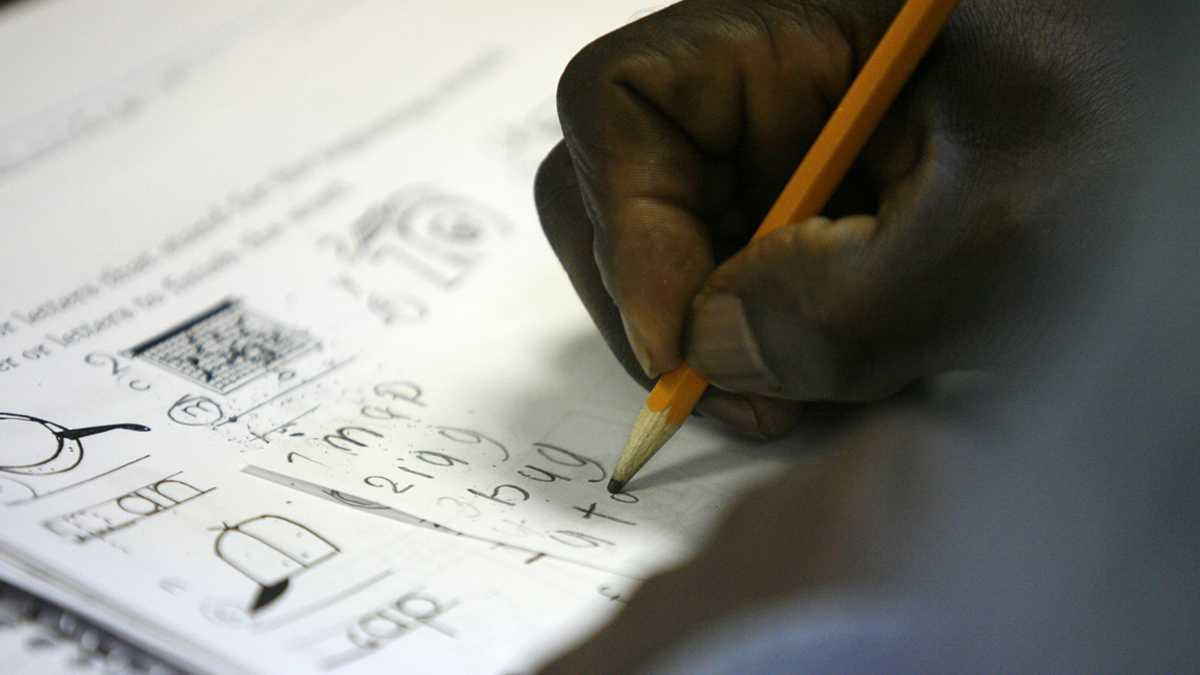Trial starts over refugee student enrollment in Lancaster

In this file image, an older student refugee from Tanzania completes a spelling exercise. (AP File Photo/Ed Zurga)
As many as 700 refugees are resettled each year in Lancaster, a high number for the city’s population. Four of them are spending today in court, where they’ll testify in a lawsuit against the School District of Lancaster.
As many as 700 refugees are resettled each year in Lancaster, a high number for the city’s population.
Four of them are spending today in court, where they’ll testify in a lawsuit against the School District of Lancaster.
The suit alleges the district’s breaking the law by refusing to admit older teen refugees or automatically diverting them to an accelerated credit program. There, the case claims, they get an education inferior to what’s available at the local public high school (particularly when it comes to English language instruction.)
But attorney Sharon O’Donnell, who’s representing the school, says “the bottom line is whether the court can tell the [Lancaster] school board where to place students.”
Pennsylvania school code says residents between 6 and 21 years old are entitled to a free public education. At least one international treaty, the U.N.’s 1951 Refugee Convention, requires refugees to get the same public education as residents of countries where they’re resettled.
The lawsuit also alleges civil rights and federal Equal Educational Opportunities Act violations by the school, which O’Donnell refuted in recent court filings.
We previously reported on the case details, and went a bit more in depth with a discussion on Smart Talk recently.
The lawsuit in Pennsylvania is similar to others filed in Florida and settled in New York this spring, and comes as refugee resettlement is expected to continue to rise.
Experiences detailed by refugee students and caseworkers today and in court filings also reflect findings of nationwide studies on education access.
‘Underage and under-credited’
Tuesday’s discussion in court has thus far focused on placement at Phoenix Academy.
Phoenix is a separate school run by Camelot Education, a private company, and houses the Lancaster district’s accelerated credit program for students who are “underage and under-credited” — i.e., who haven’t earned enough credits relative to their age to graduate before the age of 21.
The program aims to get students caught up so they can leave school with a diploma. That, O’Donnell says, is more appropriate for some students entering with little or no English proficiency and no academic transcripts — which often is the scenario for refugees.
Eric Rothschild, one of the lawyers representing the students in this case, says such accelerated programs are detrimental for English Language Learners. And Lancaster hasn’t assessed how its particular program is working, he says.
Rothschild also described the escalating restraint system at Phoenix, which risks retraumatizing refugees who’ve seen it demonstrated during orientation and used on other students.
O’Donnell refuted descriptions of an overly-punitive environment at Phoenix, pointing to student/staff ratios lower than at Lancaster’s McCaskey High School.
“It’s not the prison some would make it out to be,” she said.
O’Donnell likened the daily pat-downs and security measures at Phoenix to the process at the federal courthouse in Easton where the trial’s taking place.
“I’m sure it doesn’t make [the students] happy, but we all did it this morning,” she said. “The government has a right to keep its buildings safe.”
Phoenix’s rules also prohibit students from taking books out of the building, but allow them to come in early or stay late to study, according to Sheila Mastropietro, director of refugee resettlement agency Church World Services’ Lancaster office.
Mastropietro testified she recently questioned district officials how credits are earned faster at Phoenix than the district’s main stream classroom.
Credits are earned by “seat time”; i.e., “just being there,” she says she was told.
The lawsuit’s being brought by a total of six student refugees, represented by a team of lawyers. Aside from Rothschild, they’re from the American Civil Liberties Union of Pennsylvania and the Philadelphia-based Education Law Center.
O’Donnell declined to comment after court proceedings wrapped Tuesday.
Federal Judge Edward G. Smith is presiding over the trial. It’s expected to last through Friday at the U.S. District Court for the Eastern District of Pennsylvania’s Easton location.
Editor’s note: this post was updated to correct the name of the school’s attorney.
WHYY is your source for fact-based, in-depth journalism and information. As a nonprofit organization, we rely on financial support from readers like you. Please give today.



